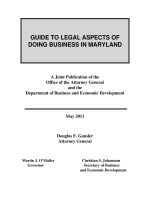What would ben stein do applying the wisdom of a modern day prophet to tackle the challenges of business and life
Bạn đang xem bản rút gọn của tài liệu. Xem và tải ngay bản đầy đủ của tài liệu tại đây (827.28 KB, 101 trang )
Contents
Cover
Title Page
Copyright
Chapter 1: Marriage: A Big, Big Deal
Shelter from the Storm. . .or Not
Chapter 2: Character Is Your Most Important Product, and Work Is
a Life or Death Matter
Chapter 3: Work = Character
Chapter 4: Work Is Not the Same as Looking for Work
Heirs and Getting Real
The Exceptions That Test the Rule
I Meant “Honest” Work
Carefree Student Days
Chapter 5: Personality, No Divas Wanted
And Also No Divas
Love Is the Boss. . .and the Gangster
Chapter 6: Getting Along in Marriage Is Not Easy—It's a Job
How Human Beings Work
No, It Isn't. That's the Way Marriage Doesn't Work
Laugh, Laugh, I Thought I Would Die
Lonely Street
The Breaking Point—and There Is One
Be Careful
The Clock Is Ticking
Chapter 7: Tipping
Chapter 8: Work Is a Gift from God
Chapter 9: The Need to Save Money Is Life or Death
Chapter 10: There Are Few Guarantees
A Firebell in the Night
Chapter 11: Your Beloved Parents
Chapter 12: Does Death Really Come as the End? Maybe Not
Chapter 13: Friendship Is Golden
Chapter 14: Don't Be Late!
To Be Late for Appointments Where You Are Not Paying People
for Their Time Is Theft
Chapter 15: Do Not Cross Other People's Borders without Being
Invited In
Chapter 16: I Am Just Like You, Only I Am Me
Feelings Come, and Feelings Go, and Feelings Are Not Facts!
Listmania
Chapter 17: You Are Not at the Center of the Universe
Chapter 18: The Next Indicated Action
Eat
Chapter 19: You Are What You Drive
I Love My Cars
A Car as a Mirror
The Hell Machine
Chapter 20: The Absolutely Fastest, Surest Way to Get Rich Quick
Chapter 21: Silence Is Golden
Chapter 22: Gratitude, Revisited
Chapter 23: A Day to Remember
Chapter 24: Save and Beware
Chapter 25: Play It Safe
Chapter 26: Be Nice
Chapter 27: Thoughts on the Economic Morass and How to Get Out
of It
Chapter 28: Progress, Not Perfection
Chapter 29: Education—To Read or Not to Read
Chapter 30: The Good Side of Drugs
Chapter 31: To the Tables Down at Mory's
A Better Day
Friends Indeed
The Gates of Eden
Chapter 32: Tax Policy
Chapter 33: Benjyrama
Index
Copyright © 2011 by Ben Stein. All rights reserved.
Published by John Wiley & Sons, Inc., Hoboken, New Jersey.
Published simultaneously in Canada.
No part of this publication may be reproduced, stored in a retrieval system, or transmitted in any form
or by any means, electronic, mechanical, photocopying, recording, scanning, or otherwise, except as
permitted under Section 107 or 108 of the 1976 United States Copyright Act, without either the prior
written permission of the Publisher, or authorization through payment of the appropriate per–copy fee
to the Copyright Clearance Center, Inc., 222 Rosewood Drive, Danvers, MA 01923, (978) 750–
8400, fax (978) 646–8600, or on the web at www.copyright.com. Requests to the Publisher for
permission should be addressed to the Permissions Department, John Wiley & Sons, Inc., 111 River
Street, Hoboken, NJ 07030, (201) 748–6011, fax (201) 748–6008, or online at
/>Limit of Liability/Disclaimer of Warranty: While the publisher and author have used their best efforts
in preparing this book, they make no representations or warranties with respect to the accuracy or
completeness of the contents of this book and specifically disclaim any implied warranties of
merchantability or fitness for a particular purpose. No warranty may be created or extended by sales
representatives or written sales materials. The advice and strategies contained herein may not be
suitable for your situation. You should consult with a professional where appropriate. Neither the
publisher nor author shall be liable for any loss of profit or any other commercial damages, including
but not limited to special, incidental, consequential, or other damages.
For general information on our other products and services or for technical support, please contact
our Customer Care Department within the United States at (800) 762–2974, outside the United States
at (317) 572–3993 or fax (317) 572–4002.
Wiley publishes in a variety of print and electronic formats and by print-on-demand. Some material
included with standard print versions of this book may not be included in e-books or in print-ondemand. If this book refers to media such as a CD or DVD that is not included in the version you
purchased, you may download this material at . For more information
about Wiley products, visit www.wiley.com.
Library of Congress Cataloging–in–Publication Data:
Stein, Benjamin, 1944–
What would Ben Stein do?: applying the insights of a modern–day pundit to tackle the challenges of
business and life/Ben Stein.
p. cm.
Includes index.
ISBN: 978–1–118–03817–8 (acid–free paper)
ISBN: 978–1–118–17352–7 (ebk)
ISBN: 978–1–118–17350–3 (ebk)
ISBN: 978–1–118–17351–0 (ebk)
1.Life skills–Handbook, manuals, etc.2.Conduct of life–Miscellanea.I.Title.
HQ2037.S73 2011
646.7–dc23 2011029293
10987654321
Chapter 1
Marriage: A Big, Big Deal
For most people in a free society who decide to get married, the most important factors in their lives
are who they marry and how the marriage works.
Life is difficult. Out there in the world of commerce or agriculture or law or medicine or
bureaucracy or the military, the individual is merely a cog in the machine. Expected to produce so
many widgets, attend so many meetings, file so many income tax returns that the way he feels, the kind
of mood he's in, all of that is extremely secondary to what he (or she) produces. What his or her
output is for the production of the almighty dollar or the almighty spreadsheet is what counts in the
real world outside the home. This means that the outside world is cutting you down to size (as the
song goes) a fair amount of time. It leaves you feeling like your life is a routine, like you're a number,
a brick in the wall (to quote another song). You—as a person, as an individual–do not count for a lot.
Bear in mind, there are exceptions. Some workplaces make you feel good about yourself and care
about you as a soulful human being. But as far as I have been able to tell, these kind of professional
environments are in the minority. It is great if you can get into one of them, but it's not a standard part
of the workday to make the worker feel good.
Shelter from the Storm. . .or Not
However, if your home is a warm, cozy place with a warm, cozy spouse, you have a fortress against
the pressures, anger, and cold of the outside world. This is no small thing. If your home is built upon
the rock of love and understanding and caring, you have a shelter from the storm. (Forgive me, but I
cannot stop myself from paraphrasing songs. Popular music is a major part of my life.)
To be sure, and I don't want to kid you about this, as many, many homes are not warm, cozy places.
Instead there are many homes that are Roach Motels of anger, sarcasm, an absence of love, and
constant fear of explosions of rage. Still other homes are poisoned pools of estrangement and
deviousness.
How do you make sure you have the kind of home that works as a fortress and a Sleep Number bed
to keep you comfy all of the time, no matter how badly Mister or Missus Recession blows at the
door? How do you make sure you have a home in which you feel protected, and not threatened or
bored or mystified by what is going on in there? How do you build that happy home you want?
There Are Two Major Ways
1. Making the right decisions about who you marry.
2. Acting decently and lovingly as a spouse yourself.
These might sound simple. They are in fact incredibly difficult. Let's first take a closer look at
making the right decision.
Chapter 2
Character Is Your Most
Important Product, and Work
Is a Life or Death Matter
Basically, choosing a mate of good character is what it's all about in marriage, as in friendships. One
immense part of this is that the man or woman in whom you are interested in must be solvent. This
does not mean rich; however, it almost always means being employed. One of the most ready ways to
discover if a man or woman (a single one, at that) is of good character is whether or not he or she is
gainfully employed. If he or she is not employed––is not going off to work each day to earn a
purposeful dollar––you generally do not want to marry him (or her). Now I know what you're
thinking. You're thinking, “That surely does not apply in a bad recession, such as we are having right
now––2011––as you are writing this, does it, Benjy?”
Yes, I am afraid it still applies. Of course we know that many fine men and women have been laid
off and have lost their jobs through no fault of their own. I am well aware of that and my heart breaks
for those people. My own dear grandfather was unemployed for many years during the Great
Depression; yet he was a fine man. But that was a Great Depression—where there simply was no
work to be found. And, as soon as there was any work at all to be had, even difficult work, below the
status he had been used to, he took it. We are not in a Great Depression now, and I pray we never
will be again. We are in a time when work is exceptionally hard to come by for many people in many
areas––but there is still work and in many areas there are labor shortages. (Think any of the major oil
and gas and non-ferrous metals extraction states. Think Washington, DC, and environs. Think of the
major agricultural regions. Think anywhere the would-be worker is willing to look day and night for
a job and take what's available.)
My experience––and I could be wrong––is that if a man or woman really throws himself into it, he
or she will find a job, even if it's not the job of his or her dreams.
I keep thinking of my wife's manicurist, who came here from the Far East, could barely speak
English, and soon had three jobs keeping her busy around the clock. I keep thinking of my daughter-inlaw, an East Indian woman who came to Los Angeles from South Carolina and simply walked her
feet raw looking for a job and found one.
Chapter 3
Work = Character
If a potential mate cannot—or worse, does not want to find a job—then this shows, barring some
unusual circumstance such as a disability, a potential character problem. I am sure there may be some
places in America where even the most assiduous worker will have trouble finding work. But in such
situations, the potential mate can move to more prosperous climes, find work, and then ask the
potential mate to move. A recession is wickedly bad, but it just is not anywhere near as cruel as a
Great Depression and to say it is, by way of an excuse for not working, is a bad sign.
I will say it again: Absent extremely exceptional circumstances, a grown man or woman should be
working prior to marriage (and—in most cases—after marriage, as well).
The better potential mate also has been continuously employed. You do not want someone who
bounces from job to job every few months. You want someone who makes at least a good faith effort
to stay on the job and do his best to be productive and get along with his fellow colleagues. My
experience—anecdotal as it might be—is that marriages that last are made up of men and women in
jobs they have held for a long time.
This does not mean they have to have had the same job all of their lives; although, that is not a bad
thing. My brother-in-law, a successful lawyer in New York City and all-around great guy, has been at
the same job since he graduated from Harvard Law School in 1962––which makes close to 50 years
as I write this––and he and my sister have been married 48 years. However, having the same position
throughout one's entire life is not a strict requirement.
Many fine people have tried several different jobs before they found the one that suited them. Your
humble scribe has had many, many, different jobs and still does to this day. But I stay at them for
some time and generally make at least a little something of myself in each one. I do not say this to
brag; I am merely making a point––that steady work, in my experience, shows a character suited to a
productive marriage more than unemployment or bouncing around within the job market, getting fired
here, or quitting in a pout there.
Chapter 4
Work Is Not the Same as
Looking for Work
I know I will get hate mail for this, but it's true and worth repeating: A man or woman who is
chronically unemployed, who cannot keep a job, who cannot predictably bring home a check––that is
someone often with character problems, who––as far as I have been able to tell in my limited circle
of acquaintances, is a major risk in the marriage department.
Heirs and Getting Real
You may well ask, “Does this apply if the person in question is of means or leisure and does not need
to work?”
My answer is definitely, “Yes.”
Our country is a very rich one at this point in time. It is not at all rare to not need to work––even
among young people. But the ones who do not work, or who pretend to work while actually doing
nothing more than producing pipe dreams of great wealth, these are––in my experience––not men and
women of good character. They are dilettantes and playgirls, and not really suited to face life's many
challenges. Therefore they are not suited to face marriage's challenges.
If any of my rich, unemployed, pipe-dreaming friends reads this, please do not be angry at me. You
can still be great pals and I am sure you are. But until you have shown the discipline necessary to
work and to stay at work, you have not been forged in the furnace that produces men and women of
strong enough personality to be married and stay married. Being married, staying married––these are
real challenges. High-carbon steel character is required, and nothing demonstrates this more than
steady employment.
The Exceptions That Test the Rule
Now, a few caveats. The need for employment does not apply after a certain age. If a hardworking
person has reached his late fifties or sixties and no longer needs to work and say, decides to devote
his time to golf and charity, he can still be a perfectly fine marriage partner, and probably will be, in
fact. As long as a man or woman has shown that he or she can work, over a period of time (relative to
his or her age), he or she can be counted on to have satisfied the work requirement.
There is another large exception in addition to the I've paid my dues by being married to you for
30 years exception: To be considered a good marriage partner, a man or woman need not have
worked on a factory floor or in an office or a shop continuously for a long period. Yes, I know I said
that consistent work is important. But not all work can be consistent, steady work. For example, some
men are real artists––not phony, fraudulent artists, but actual artists who make a living at it. Maybe
that's the person in your life. If a person has an honest job that pays the bills, that's fine. This is
especially true, again, when the nature of the work is sporadic. I'm reiterating this because my wife
reminded me that when we got married, she was a lawyer (steady job, or so it seemed) and I was a
screenwriter, columnist, novelist, and author of novels, diaries, and tomes about finance. Mine was
sporadic work (although I always had a lot of it and could not keep up with the backlog) and hers was
steady work, but it worked out fine. More than fine.
I was used to hard work. . .and so was she. It is that custom––getting work done and being
accustomed to discipline––that is the main point. And it all comes back to character––the touchstone.
If it is the kind of work that shows character, it's good work. If it's the kind of work that shows either
no character or its twin, bad character, that's something else entirely.
I Meant “Honest” Work
If, for example, you have a person in your life who is intelligent and hard working, but his work is
selling people fraudulent investment products, that person probably is not good marriage material.
Honesty and trustworthiness are character traits that one wants in a spouse. So don't be fooled; hard
work by itself is not a sufficient marker for good character.
Carefree Student Days
Now, what about getting married young?
Here, I admit a bias. I got married when I was a law student and graduate student in economics. My
wife was an undergraduate in college. My parents got married when they were graduate students. My
son got married when he was a student.
All of the marriages have lasted, or did last, a long time. My parents’ lasted for 60 years, until my
mother died. My wife and I have been married since 1968. My son has been married about three
years, which is a lot considering that he is 23.
Many of my closest friends from the whole range of my life got married when they were young,
usually while in graduate school. Most of those marriages have lasted, although not all. The line I can
draw about which marriages have succeeded and which marriages have not surrounds––once again––
discipline. The men and women who were self-supporting, by means of work in school, are the ones
whose marriages lasted. If these men and women had the work ethic to keep up their grades and also
bring home the bacon, they usually were able to have the grit to stay married.
If a man and woman, even as students, can run a household while learning and earning, he or she
probably has at least some discipline, and again, this discipline is what it's all about.
I will say that if a young couple is completely supported by their parents, this possibly works
against their turning out to be great marriage partners. They are basically just children in a playpen of
marriage unless at least one of them is earning money for school in some way––even if it's by parttime work.
So, now that we've assumed you have found a hardworking man or woman, in a reputable job,
earning a decent living, not running afoul of the law, not in a job that would make you afraid to bring
him or her home to mother. What next?
Chapter 5
Personality, No Divas
Wanted
In terms of what makes a marriage work, first comes great looks and a great body, then personality.
JUST KIDDING!!! Actually, you do want to be attractive to your spouse. If you are not physically
drawn to a potential man or woman when you first start courting, you will probably not find that
person more attractive as he or gets older, fatter, and more wrinkled. So, yes, appearance definitely
counts.
But, let's get back to personality. All kidding aside, personality is absolutely vital. For a marriage
to work, it is vital beyond words that your potential spouse has a pleasing personality. (And that you
do as well; we'll get to more of that in a moment.) Accept no substitutes. Do not allow someone in
your life who is judgmental, who endlessly finds fault, or who loves to pick fights. And, if a person
ever, and I mean EVER, compares you unfavorably to a past lover, politely gather up your clothes,
explain that you are feeling ill, get dressed, and leave and never come back. Don't call. Don't answer
the phone or text or e-mail. Just move on. Trust me.
Men and women who are good marriage material do not ever say you are less than ––in any area.
Not ever. Yes, of course they can bring up an old flame to tell a funny story or to illustrate a noncritical point, but never in such a way as to compare you unfavorably.
I don't ever want to hear that someone else bought my wife a more lavish gift. (And I don't think I
will, since my wife had cheapskate boyfriends until she met me.)
And Also No Divas
You do not want a wife or a husband who throws fits. Although that makes for good drama, you don't
want your life to be drama. You want your life to be calm. (We'll get to that later, too.) You want
peace in the valley. Marriages that are peaceful last. Marriages that are wildly up and down wind up
in family law court.
You cannot imagine how many evil, controlling spouses there are in this world. I have had close
friends whose wives spent day after day, year after year, screaming at them and telling them what
losers they were.
Let's just get it straight: If you have a boyfriend or girlfriend who judges you, who gets drunk or
high and abuses you, who––again––compares you with other lovers unfavorably, get the heck out of
there in a great hurry.
You may hear your lover say, “I'll change.” DO NOT BELIEVE IT. Human beings do not change.
Or, to put it another way, human beings change so rarely that one might just as well assume that they
do not change at all. Let's see the viper turn into a Cocker Spaniel for 24 months and then we'll see
what's what.
Again, do not, not, not trust the people who abuse you, mistreat you, or belittle you. Don't even try
to change them, even though they swear they will change: Just walk away.
There Are Several Close Kin to This Advice
1. Childhood Counts
If your partner has undergone some traumatic, deeply wrenching events in his or her childhood or
youth, those horrors will always, and I mean always, come out to bite you. Not maybe. Not
sometimes. Always.
Children from abusive backgrounds deserve a huge warm blanket of sympathy. But even so, they
will show signs of distress, and those signs of distress may make for difficult living conditions.
2. Drugs and Alcohol Are Not Good Wedding Gifts
If your lover has a drug or alcohol addiction, be extremely wary. In general, long-term use of
drugs leads to personality changes for the worse.
Abusing drugs and alcohol diminishes the ability to maintain focus and ambition and discipline
on the job or in the home. The job suffers and then goes away. The business suffers and then goes
into bankruptcy. It all goes bye-bye when drugs and alcohol are in use on a chronic basis.
Just as a word to the wise, potential mates who are habituated to drugs, dependent on drugs,
addicted to alcohol, or even whose parents are in that situation are poor prospects for marriage.
They can be saved, and I have seen them saved, but the odds are long.
3. Family Ties That Choke
Parents can be a trap. It is incredibly difficult being married, especially at first. You suddenly
have turned a good chunk of control over your life to someone other than yourself. As I often tell my
wife, the essence of marriage is that you are in the car on the freeway and one of you thinks the car
is too hot, and one thinks it's too cold. One wants to turn on the air conditioning. One wants to turn
up the heat. What do you do? How do you compromise?
If you have parents mixing in their views of the temperature or how fast the car should go or what
lane it should be in, that gets to be even more trouble. Many cars nowadays have different
temperature controls for different sides of the car. But as far as I am aware, no car has been able to
accommodate viewpoints of those not actually seated in the car.
This, again, presents a serious challenge. It is one thing to have all of the problems of acclimating
yourself to a totally sovereign other individual. To suffer many others messing in your lives, with
their view being that they know best, is maddening.
Alas, that is the basic condition of in-laws and parents (not to mention siblings and children by
prior marriages). If you find yourself in love with a man or woman whose parents routinely and
offensively interfere, you are possibly facing serious danger.
If your lover has parents who are emotionally supportive but who butt the heck out whenever
anything serious is at issue, you have won the lottery.
4. Money and Love
“The love of money is the root of all evil,” says the Bible. Very likely this is an exaggeration.
There are many other sources of evil, especially envy and jealousy, but certainly money and the
infinite complications around it are at the root of much of what kills marriages.
If you have a potential spouse who spends money she does not have, who gets herself head over
heels into credit card debt, then unless you have a virtually infinite amount of money, you are going
to have problems. If you have a boyfriend who gambles away his money and who habitually loses
his paycheck, you will likewise be in jeopardy.
By the same token (or maybe it's by a different token), the boyfriend who is maniacally cheap and
goes berserk at even the slightest extravagance is a killer as well. Different attitudes about money
lead to conflicts, fights, anger, and loss.
The really big problem is that men and women have extremely deep-seated attitudes about
money. It is very hard to convince anyone that his attitudes about the long green are mistaken once he
is set in his ways.
Money, so I read, is one of the great marriage saboteurs, and it's best to have someone in your
life who at least generally shares your views on this dismal subject. I will be the first to say it is not
an easy task to find such a person; so with that said, just realize that you must have at least some
basis of trust.
Money is so basic, so fundamental, and generates so much anxiety, that unless you can see the
other person's point of view and adjust to it, there is no hope the marriage will last. Conflicting
attitudes about money lead to literally life-ending anxiety in some cases.
Love Is the Boss. . .and the Gangster
Now with all of this said, and read thoughtfully by you, I know what you're thinking. You are thinking,
“But what if I really, really, really love him (or her)? What if my love is so strong that it compels me
to overlook all of these issues that you so cheerlessly bring up, like a cruel bookkeeper instead of
Cupid?”
I am telling you all of these mistakes you might make, because I have made them all myself. I have
fallen for women with mental problems. I have gotten involved with vicious, castrating, psycho
women––and been hopelessly in love with them. I have been wounded in love, and I have been
wounded in hatred.
I have seen every warning sign flashing, and I have driven over the cliff anyway.
So, I know how hard it is to take good advice. In my own life I have made every mistake a man can
make in love.
But, and this is a big but, I am still alive and smiling because I did recognize that I had made a
mistake and managed to pull myself together, clamber back up the cliff, crawl over broken glass and
molten lava, and find myself in a happy, warm home again.
I did many, many, wrong acts and deeds and hurt myself and those close to me badly while in the
throes of love. But I turned back and even turned myself into a far more productive and useful human
being. I did this through getting great advice, through 12-step programs, and through finding a God
who would save me from harmful, abusive relationships. (This is another chapter racing towards
you.)
So while I do realize that my advice will most likely not stop you from falling in love and getting
hurt, it might allow you to realize––once you start really and truly hurting––the reasons behind your
hurt. It's not fate. It's not destiny. It's not inevitable or permanent. There are certain types of people
who are liable to hurt you. If you read this, look over at the man or woman sleeping next to you, or
sniffing glue next to you, and say, “Hey, no wonder this hurts so bad. This is just the situation Ben
Stein warned me about. I think I'll get the heck out of here. Better late than never.”
If this were only for the few who realize the inevitable poison in their life, then this chapter were
well spent. Think of this verbiage from me as a map. You didn't consult it on the way in, but maybe
now that you're totally lost, you will feel like consulting it on the way out.
Chapter 6
Getting Along in Marriage
Is Not Easy—It's a Job
But a super-important job. Let me try to explain it to you by anecdote.
Many years ago, when my beloved father was living, he religiously read the columns I wrote in the
form of a diary for the American Spectator. In that column, long ago, I had a satirical name for our
son's elementary school. It was affectionately satirical, but definitely had a bit of mockery mixed into
it.
One day my father asked me, “Is that school important to your son and to bringing him up?”
“Indeed, it is,” I said.
“Then why aggravate them by making fun of them?” he asked, very sensibly. He was right, as he
almost always was, and I immediately stopped poking fun at them. That school was the linchpin of
our lives when our son was young, and there was indeed no reason to take a cheap shot at an entity
that was so important to us. . .and doing such a good job for us.
You can look at your marriage partner the same way. That man or woman is the most important
person in your life. The marriage—that place that is heaven if it's happy and hell if it's not—is the
most crucial part of your life. If it works out well, you have a major leg up on every other part of your
life. If it does not work out well—if you are miserable and tormented in your marriage no matter what
else is going well—no matter how rich and famous you are, nothing is going to keep you happy.
In other words, it is worth investing a heck of a lot in keeping that marriage going and keeping it
happy. It is worth more than getting drunk or hanging out with your pals or showing off to your spouse
how tough you are. It is worth almost everything else in your life.
How Human Beings Work
But how do you make the marriage happy? Well, first of all, let's assume you are not married to any of
the desperate and unpleasant characters we discussed in the preceding chapter. Let's assume you are
married to a fairly normal man or woman. (That's a very big leap, to be sure, since my experience
tells me there are not too many really “normal” and sane men and women out there. But let's assume
there are at least a few. . .and that you are married to one of them.) How do you keep the marriage
with that person fulfilling and happy?
Really, it's pretty simple. You work day and night to make that marriage partner happy. You act as if
you are a candidate running for office and your marriage partner is the last vote you need to win. You
act as if the husband or wife is the buyer of the order so big that once you close the sale, you will be
on Easy Street for the rest of your life. You make sure that within the boundary lines of dignity, you
make your spouse as happy as she or he needs to be. You treat her as a life-or-death matter, and him,
too.
There is a famous line from the Buddha that a Buddhist friend from long ago used to tell me:
“There are three rules of life: Pay attention. Pay attention. Pay attention.”
Pay a lot of attention to your spouse. Pay a lot of attention to your spouse. Pay a lot of attention to
your spouse.
That means. . .you campaign all of the time for that person's affection as if the presidency of the
universe depends on it.
Now I don't really mean all of the time. Obviously, if you're ill or just hit by a car, you can sulk and
moan. If you just got laid off, you can be sad for awhile.
But most of the time, you want to be as complimentary, accommodating, forgiving, cheerful, and
lavish with praise as you can possibly be.
That man or woman you are married to is not your slave; not your whipping post; not your child.
Like any other human being, he or she responds better to praise than to criticism. Like any other
human on the earth, he or she wants to be noticed, appreciated, loved, thanked, and treated with
respect. This is what you do. You treat that person with respect and love and forgiveness and
gratitude.
Now some readers might say, “Hey, Benjy, this woman is my wife. It's her job to deal with my
moods and to put up with me if I'm surly to her.” Another reader might say, “Hey, he's my husband. I
don't have to coddle him. He signed up ‘. . .for better or for worse. . .’ If I want to be nasty to him, I
can. That's the way marriage works.”
No, It Isn't. That's the Way Marriage Doesn't Work
You have to treat your partner with respect. That person whom you order around and then ignore has
a soul and a personality and wants to be treated with total respect. People do not like to be badly
handled, and when they are, they take it hard and relationships wither.
This is big stuff. Think of how respectfully you would behave toward your boss if you knew he or
she was considering a big promotion for you. You would be act like that boss was the king of
England. But your spouse is far more important to your well-being than your boss. Your spouse is
vastly more vital to your long-term happiness than your boss will ever be. If you find that you
criticize your wife for something you would laugh off with your office colleagues, you are making a
mistake. If you find you are picking on your husband over something that you would find cute or
engaging in a friend's spouse, you have to knock it off.
There are thousands, maybe tens of thousands of books about marriage. For my money, the very best
book you can find on the subject of how to make your marriage work is How to Win Friends and
Influence People by Dale Carnegie. In that book, Carnegie lays out a sure path to get people to like
you and want to be your friends and do what you want them to do. The basic ideas are to be
complimentary and accommodating, to never pick fights, and to do whatever is possible to make the
other person happy and content.
This book, this hoary chestnut, really tells you more about how to make your spouse content, and
thereby make your marriage happy, than any other book I have ever read.
Now that lurking, alert reader will say, “Hey, what's going on? Why do I have to be the one who
accommodates? Why can't he/she be the one who does the accommodating? Why can't I be the prima
donna?”
The answer is simple: In a marriage where one is the diva, neither will be happy. The diva will
never be satisfied with her diva-ness and the servitor will never be happy with his drudgery. But in a
marriage where each seeks to accommodate the other, both will be happy. In a marriage where the
goal is not to get all you want but to be as helpful as you can be; helpfulness, an even temper,
forgiveness, and good faith become the watchwords; and love glows and grows. This happens to be
fact.
In a marriage where each partner can count on the other to work for the other's good, there is a
warm, soft, cheery atmosphere. There is not the fighting, sharpening-of-knives attitude that makes for
short tempers and short marriages.
“To get along,” said a famous politician named Sam Rayburn, once Speaker of the House of
Representatives, “you have to go along.” That was how he worked as a successful Speaker of the
House. That is how you can and must make your marriage work: Getting along with your spouse
comes ahead of anything else.
A good, lively sense of humor is a key part of this scheme. In one of my many 12-step programs, we
have a saying. “If you can't laugh at yourself, you're missing the funniest joke there is.”
Laugh, Laugh, I Thought I Would Die
Likewise, in a marriage, try to laugh with your spouse. Try to see the humor in everything you say and
do. If you can laugh at yourself, if you can chuckle at your own obsessive-compulsive demands to
keep changing the thermostat of your marriage, you will go a long way toward making your marriage
last. A marriage where both sides—where both partners—take each other terribly seriously is like a
stiff but fragile reed. It will break in a strong wind.
But a willowy, supple sense of humor as the spine of a marriage will bend but not break.
A good way to evoke that sense of humor is to seek to imagine what you and your spouse are doing
is on YouTube. Would you laugh at yourself or would you think that what you are doing is really
incredibly momentous? Or imagine that it's 10 years later, and you're recalling this incident. Would
you consider it life-or-death important?
Lonely Street
To follow this last little engine of thought for another moment, when you are considering how angry
you are at your wife or husband, try to imagine that you are so angry that you allow that anger to break
up your marriage. Then imagine that for the rest of your life, you come home to an empty home, for not
just for a day or two, but forever.
Try to imagine a life without that person who knows you so well, who has known you most of your
life, and who knows all of your jokes from 20 years earlier. Or, think of re-entering the dating scene!
The point is that it's difficult to imagine the Herculean effort of finding a man or woman who accepts
your problems and issues, your bad moods, your bad hair, your belly, or your shrew of a mother. That
is why it's important to always remember just how much effort you have put into making your
marriage work. Try to imagine, again, just how lonely you would be without this man or woman who
has put up with so much of your nonsense—and at whom you are so angry, maybe just for a few
minutes.
It is not fun to be lonely—and especially not to be middle-aged and lonely.
That means, again, do whatever you decently can to make the marriage work. Go beyond what is
adequate. Go beyond what is standard. Be super spouse.
This kind of behavior, this super-spouse behavior, most definitely includes forgiveness on both
sides. Inevitably, you will say things that are hurtful, or at least taken as hurtful. If those words offend
your spouse, you must apologize. Words have power. If you have used them, even inadvertently, to
hurt or harm, you must thoroughly apologize.
Actions have power. If you have acted so as to hurt your partner, say by drinking too much at a
party and saying wounding things, you must apologize.
If you have in some way betrayed your spouse—say by wildly overspending when you were
supposed to be on a budget, you must very emphatically apologize, promise not to do it again, and
mean it.
But you must also accept the apologies of your marriage partner. You must forgive, at least for a
good, long while. I know it's hard to forgive some acts and some words by your spouse. They can cut
like a knife.
I have seen this up close and personal in a marriage (not mine). I have seen the most vicious
behavior I could ever imagine aimed at a husband by a wife—the wife wasn't even drunk! With all
my heart, I believe that if the husband in this interchange had killed the wife in this case, he would
have been forgiven by a jury of his peers. That is how hateful and hurtful the words were.
Yet this woman learned the error of her ways. She apologized and stopped her cruelty. She became
a far better wife. And by the end of this marriage, the couple was extremely devoted to each other:
caring, laughing, and growing old together. They are now are buried next to each other.
Forgiveness is possibly the most powerful force for good in the universe. In any situation in which
there is even a little bit of goodwill, forgiveness will work wonders.
Along with the kind of caring and diplomacy I am suggesting, you can and will get a stupefying,
good result from forgiveness. Forgiveness helps the forgiver and the forgiven.
Try it. Try to make treating your spouse as the most important person in the world your most
important job on a daily basis. Try making forgiveness your routine response to misconduct by your
spouse—as long as there is a meaningful apology.
The Breaking Point—and There Is One
However, all of that said, it is sad but true that there are some marriages that cannot be saved. There
are some men and women who cannot be reached by even the kindest, most considerate behavior.
They are out there, and I am sorry to say they are not rare.
In today's world, where so many young men and women are brought up to believe the world
revolves around them, where so many of us genuinely think we are some sort of Fuhrer whose will
cannot be questioned, there are some difficult characters to whom you will find yourself married. My
pal, Phil DeMuth, likes to remind me that at least 25 percent of all Americans have a diagnosable
mental illness. (Other mental health professionals I have talked to think that is a low number.)
So, by all means act with respect, deference, accommodation, a sense of humor, and forgiveness.
And do it for a long time. If human beings change at all, they change slowly. Agonizingly slowly.
But if your spouse resists, if your spouse considers your helpfulness weakness; continues to boss
you around; shrieks at you even more—makes you wish you were not married to her or him any
longer—you should not be married to that person.
My dear pal, Ona Murdoch Hamilton, a simply brilliant psychologist, says that the acid test of any
relationship is whether the parties feel happy being with each other. If they do, they should stay
together. If they hate their time together, if they truly loathe and resent every tick of the clock while
they are with each other, they should not stay married.
Be Careful
Bear in mind, d-i-v-o-r-c-e is extremely expensive and painful. It tests the good humor of even the
steadiest personality. The lawyers who handle it are often shockingly well paid. The rage that comes
out when money and property have to be divided is phenomenal. The fury that comes out when the
custody and care and provision for children are under judicial review is mind-boggling.
Police consider domestic disturbance cases the most dangerous situations, because the parties are
in such a fury when they get to the point where the police are called.
Imagine the state of mind of the parties involved in a bitterly contested divorce case. Imagine their
condition of mind and soul. Now, imagine that's you. Imagine being torn apart by lawyers who have a
lifetime of training in how to make you feel upset and angry about your life. Imagine forensic
accountants who go through every piece of paper about money and property that has ever been seen—
even by you, let alone owned by you. The motive behind this is to impoverish you and make you
miserable and desperate.
Try to think of what your days will be like when the person who knows you the best in the world
can and will use every bit of that knowledge to hurt you.
Try to think of your kids being turned against you. Try to think of every bad thing you have ever
done in your life, every questionable remark, everything, all used against you.
Then try to think of how you could possibly function in your job or practice or business with that
kind of warfare going on in your head.
That's divorce. Not always. Not even most of the time. But enough of the time that it's a very real
danger.
In other words, consider carefully before you get a divorce. You might want to go on a long
vacation alone. You might want to try a trial separation. You might want to see a therapist. But you
almost certainly will not want to rush into divorce.
That being said, sometimes you still have to get divorced. It is better to be poorer and more alone
than to live with your own Gestapo, your spouse. It is sad that it works out like this, but it sometimes
does.
If your marriage does come down to a divorce, do your best to keep your cool and be as charming
and friendly to your spouse as possible. Remember, you might someday change your mind.
I offer my own very bad self as an example:
In 1968, I married my first wife, a beautiful woman who had just turned 21 the day before, a
blushing junior at Vassar College. In 1972, because of good and sufficient reasons, we became
separated. In 1974, we got divorced. After a series of romantic comedies and tragedies, it became
clear to me by late 1975 that my first wife was the only girl for me.
I can still vividly recall a trip to New Haven, Connecticut, in late 1975, to Elm City, where we had
lived when I was a law student and grad student in economics. I walked in front of the tiny apartment
house where we had lived and played. I felt such acute sorrow that my wife and I were no longer
together that I could scarcely breathe. I thought my heart would just stop beating with melancholy.
(This was in front of 34 Lynwood Place, in case anyone at Yale is reading this.)
Little did I know that my former wifey was in Washington, DC, practicing law and thinking the
same thing. In a few weeks we were dating again, and in September of 1977, we were married again
and, with a few hitches, we have been married ever since. We both tried not to slam any doors, and
that allowed the miracle of our getting back together.
I realize that ours is a rare story. I realize that this kind of fairy tale twist almost never happens. But
whether it does or does not, you have nothing to lose by consistently acting as kindly and well as you
can bear to do to your former spouse.
Just for an example of why you want to do this. . .while my wife and I were separated, I started
work at The White House as a speechwriter for the late, great Richard M. Nixon. I needed a Top
Secret security clearance to turn that temporary job into a permanent job. The FBI interviewed my
wife, who spoke glowingly of me, as I always did of her. The FBI man doing the interview told my
wife he had never heard of a former wife speaking as highly of her ex-husband as she did of me. That
was a factor in my getting that security clearance. (Just exactly why I needed a security clearance
when I never saw anything even remotely connected with national security is unclear.) And, of
course, the tides of fate determined that my job—and Mr. Nixon's—would be extremely temporary.
In any event, you have nothing to lose by being as polite and friendly to your ex as possible, even
when it's a true challenge to do so. And you have nothing to lose in keeping an open mind about
whether you want to go back and seek to open that door once more, as my wife and I did.
So, what would Ben do about marriage? Take it seriously. Take it as the immense part of life that it
is. But also take it, as my dear friend, Al Burton, told me long ago, “with one eye closed.”
The Clock Is Ticking
And one final note: As I was writing this little tome, my wifey and I went out to dinner with a large
party of mature men and women at a club near our home in Rancho Mirage, California. The women in
the party were mostly older than we were: In fact, they were in their eighties. All of them except one
were widows. As the evening went on, the women started to reminisce about their late husbands and
the good times they shared with their late husbands. Every single woman at the table who had lost her
husband teared up—even if the husband had been gone for 10 years or more. When the evening broke
up, the widows—all of whom lived at the club, within a short walk or ride from the clubhouse where
we were eating—were noticeably reluctant to go home to their empty homes.
It was heartbreaking. It reminded me for the millionth time, for the billionth time, that every day,
every hour, every minute, every heartbeat I have with my wife is precious. More than precious.
Spectacularly precious.
We drove one of the widows back to her home at another club near our house. She talked about
how lonely she was at home with her dog. When we pulled the car up to her home, she insisted on
showing her dog to me. And while the dog was cute and faithful, the house looked big and lonely and
empty without a husband waiting there for her.
I put this out there for you: If you possibly can, find a good spouse. Once you do, treat that spouse
like gold. There are very few men and women out there who will be perfect mates for you, or even
close to perfect. Once you find one who even approaches the mark, do everything you can to make
sure you do not come back to an empty house. And weigh in your heart extreme gratitude for every
second you have together.
Of course, if your husband or wife is horrible, that's a whole different story.









